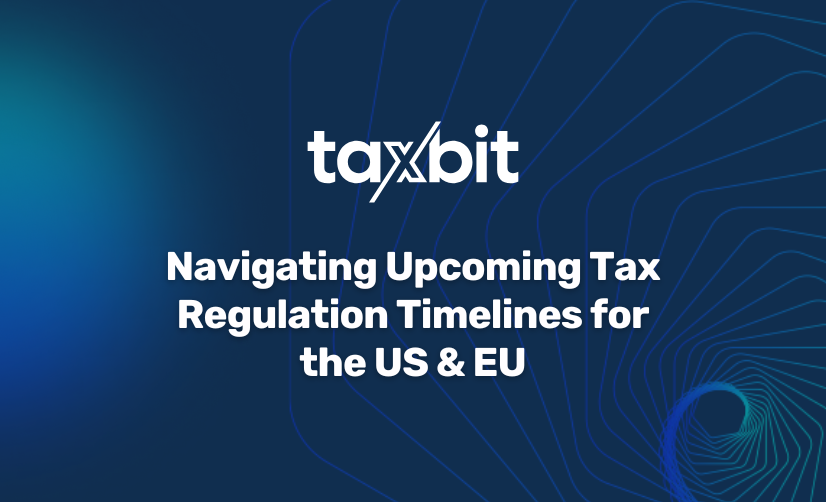Stay on top of new and changing regulations across the US and EU
Navigating Upcoming Tax Regulation Timelines for the US & EU
Stay on top of new and changing regulations across the US and EU
Reporting Timelines
Keeping track of and navigating all the upcoming tax regulations across the US and EU can be near to impossible. Enterprises doing business in the US and EU can rest easy with our US and EU regulatory timeline below, as well as a high level explanation of the impactful new requirements they will face in the near term.
Regulatory Changes in the United States
IRS Proposed Digital Asset Broker Regulations
The U.S. Treasury Department issued proposed regulations clarifying the definitions, requirements, and implementation timelines for digital asset brokers’ tax information reporting requirements as outlined in the Infrastructure Investment and Jobs Act (IIJA) passed by Congress in 2021. As noted in the IRS Newsroom, “These proposed regulations are designed to help end confusion involving digital assets and provide clear information and reporting certainty for taxpayers, tax professionals, and others,” said IRS Commissioner Danny Werfel.
These proposed regulations define a “Digital Asset Broker,” outline what constitutes a digital asset, and outline the requirements for brokers to collect their user’s tax information, cost basis, and 1099-B tax reporting. It is important to note that these regulations have not been finalized. The IRS is accepting comments on the proposed regulations and held a virtual public hearing on November 13th. All comments made to the IRS are public and can be viewed on the federal commentary docket website.
For additional details, see our breakdown of the proposed regulations.
1099-K Threshold Reduced to $600
As part of the American Rescue Plan of 2021, the Form 1099-K reporting thresholds related to third-party network transactions were dramatically reduced to gross payments that exceed $600, regardless of the number of transactions, significantly increasing the number of Forms 1099-K that will be required to be filed. Payers have been keeping their eye on whether or not the IRS would provide additional relief for tax year 2023.
On November 21, 2023, the IRS announced a further delay in the reduction of the 1099-K threshold. As noted by the IRS, “ the agency will treat 2023 as an additional transition year. This will reduce the potential confusion caused by the distribution of an estimated 44 million Forms 1099-K sent to many taxpayers who wouldn’t expect one and may not have a tax obligation. As a result, reporting will not be required unless the taxpayer receives over $20,000 and has more than 200 transactions in 2023,” The IRS anticipates that the threshold will increase to $5000 for tax year 2024.
It is important to keep in mind that many states have a threshold below that of the federal one.
Regulatory Changes in the EU
Directive on Administrative Cooperation (DAC7)
DAC7, or Directive on Administrative Cooperation (DAC) 7, is a regulatory framework introduced by the European Union. It focuses on gathering and reporting data about natural and legal entities related to their earnings through digital platforms and marketplaces. The directive aims to promote transparency, reduce tax evasion risks, and create a level playing field for businesses
For even more details on DAC7, see our breakdown.
Crypto-Asset Reporting Framework (CARF)
On October 10, 2022, “In light of the rapid development and growth of the Crypto-Asset market,” the OECD, which has 38 member countries, published the final guidance for the Crypto-Asset Reporting Framework (CARF).
On November 10, approximately 47 countries published a statement that they plan to “swiftly transpose ” CARF into domestic law, and intend for active exchange of information to commence by 2027. The intended effective dates for the remaining 38 countries are still unknown, but theOECD, intends to work towards global adoption and implementation of CARF, so it’s incorporated into the local laws of member states.
7th Amendment to Directive on Administrative Cooperation (DAC8)
DAC8 will extend the scope under DAC to crypto-asset service providers on exchanges and transfers of crypto assets and e-money. The provisions of DAC8 significantly overlap with CARF and ultimately mean that crypto-asset service providers will be obligated to report certain information about transactions involving EU residents. This adopted Directive will enter into force on November 13, 2023, and Member States will have until December 31, 2025 to transpose the new rules into local law with the first application from January 1, 2026.
Markets in Crypto Assets Regulation (MiCA)
MiCA will require that Crypto-Asset Service Providers need registered offices within the EU and meet various requirements, including minimum capital, governance and risk management, and publication of a white paper before any issuance of a crypto-asset. MiCA will also introduce stringent rules for stablecoins.
Central Electronic System of Payment Information (CESOP)
The Central Electronic System of Payment Information (CESOP) is a new EU initiative to combat value-added tax (VAT) fraud related to cross-border payments. By Q1 2024, Payment Service Providers (PSPs) in the EU will be required to report cross-border payments on a quarterly basis. This initiative aims to bring transparency and compliance to cross-border transactions, particularly those involving e-money institutions. Understanding CESOP and its applicability is particularly important for digital asset enterprises as many will fall into the PSP category for e-money.
See our CESOP compliance guide for more information
Unlock Seamless Compliance
Navigating the complexities of new and changing regulations can be challenging, especially with the impending timelines. Taxbit is here to help enterprises unlock seamless compliance across the US and EU with the Taxbit Tax Suite.
Taxbit’s platform enables a single system of record to unlock scalable and seamless tax compliance that is built to meet your business needs now and into the future while reducing the burden on your internal teams and customers with a best-in-class compliance experience.

Staying compliant is paramount in the rapidly evolving world of regulations across the US and EU. With Taxbit’s support, enterprises can navigate this new landscape confidently, ensuring transparency, trust, and compliance.
Learn more about how Taxbit can assist your business with a scalable tax compliance solution.
.png)


